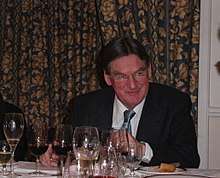Hugh Johnson (wine writer)
Hugh Eric Allan Johnson OBE[1] (born 10 March 1939, in London) is a British author and expert on wine. He is considered the world's best-selling wine writer.[2] A wine he tasted in 1964, a 1540 Steinwein from the German vineyard Würzburger Stein, is considered one of the oldest to have ever been tasted.[3][4]
Hugh Johnson | |
|---|---|
 Hugh Johnson in 2003 | |
| Born | Hugh Eric Allan Johnson 10 March 1939 London, England |
| Occupation | Writer |
| Nationality | British |
| Subject | Wine, Gardening |
Early life
He was born the son of Guy F. Johnson and Grace Kittel, educated at Rugby School and read English at King's College, Cambridge.[5]
Career
Johnson became a member of the Cambridge University Wine and Food Society while an undergraduate in the 1950s. On describing his introduction to wine-tasting Johnson has recalled:
...my room-mate Adrian Cowell, committee member of the University Wine & Food Society came in after dinner with two glasses and said, "Come on, Hugh, are they the same? Or different?" Both were, I am sure, red Burgundy, but one was magic and one was ordinary. This caught my imagination. It was my Damascene moment.[2][6]
Johnson has been writing about wine since 1960, was taken on as a feature writer for Condé Nast Publications upon graduation, and started work on Vogue and House & Garden, becoming in 1962 editor of Wine & Food and in the same year wine correspondent of The Sunday Times, of which in 1967 he became Travel Editor. From 1968 to 1970 he edited Queen magazine in succession to Jocelyn Stevens.[7]
He has published a wide array of books, starting with the publication of Wine in 1966. The World Atlas of Wine (1971) was considered the first serious attempt to map the world's wine regions, described by the director of the INAO as "a major event in wine literature".
Since its launch in 1973 Johnson has been President of the Sunday Times Wine Club, part of Laithwaites, now the world's largest mail-order wine merchant. From 1986 to 2001 he was a Director of the Bordeaux First Growth Chateau Latour and in 1990 was a co-founder of the Royal Tokaji Wine Company in an attempt to rebuild the foundering Tokaji industry after Communism. In 1986 he started the Hugh Johnson Collection, which sold (until 2010) wine glasses and other artefacts related to wine, mainly in the Far East, with a shop in St James's Street, London.
His book Vintage: The Story of Wine, an authoritative 500-page compendium, was first published in 1989 by Octopus, and re-edited in 2004 as a fully illustrated edition published by Mitchell Beazley. It also was made into a 13-part TV series for Channel 4 and Boston P.B.S., first airing in 1989. Since 1977 he has compiled his annual Pocket Wine Book, selling many million copies in up to 14 languages.
In 1973 Johnson wrote The International Book of Trees. In 1975 he became Editorial Director of the journal of the Royal Horticultural Society (The Garden) and its columnist, "Tradescant". "Trad's Diary", now in its 37th year, appears online and in Hortus magazine. In 1979 he published The Principles of Gardening and in 2010 a new rewritten edition of Trees. "Trad's Diary" has twice been anthologised, as Hugh Johnson on Gardening (1993) and Hugh Johnson in the Garden (2009).
He was selected Decanter Man of the Year in 1995, and was promoted Officer in the French Order Nationale du Mérite in 2004 and Officer of the Order of the British Empire (OBE) in 2007 "for services to wine-making and horticulture". He was awarded the Veitch Memorial Medal of the Royal Horticultural Society in 2000.[5]
Johnson is known as one of the wine world's most vocal opponents to awarding numerical scores to wine. In the autobiography A Life Uncorked, he also expressed regret over the wine critic Robert Parker's influence on the world of wine, which has in his view moved winemaking in many regions towards a more uniform, bigger and richer style.[7] In 2005 Johnson stated, "Imperial hegemony lives in Washington and the dictator of taste in Baltimore".[a][8]
Selected publications
- Wine (1966)
- The World Atlas of Wine (1971, eight editions; since 2004 co-authored with Jancis Robinson)
- Trees – A Lifetime's Journey through Forests, Woods and Gardens (2010)
- Hugh Johnson's Pocket Wine Book (1977, since published annually)
- The Principles of Gardening (1979), Mitchell Beazley Publishers (UK)/Simon & Schuster, Inc. (US)
- Hugh Johnson's Wine Companion (1983, six editions)
- The Story of Wine (1989), and illustrated re-edition (2004), Mitchell Beazley/Octopus, London, UK
- The Art and Science of Wine (1992, co-authored with James Halliday)
- A Life Uncorked (2006, autobiography, anecdotes and opinions)
- Hugh Johnson's Wine Guide 2012, iPhone app (2010)
Television
- Vintage: A History of Wine (1989)
See also
References
a. ^ Robert Parker resides in Monkton, a small town in Baltimore County, Maryland.
- Footnotes
- Lechmere, Adam, Decanter.com (8 January 2007). "Hugh Johnson honoured with OBE". Retrieved 13 March 2020.
- Sale, Jonathan, The Independent (17 January 2008). "Passed/Failed: An education in the life of Hugh Johnson, the world's bestselling wine author".
- G. Harding "A Wine Miscellany" pg 22, Clarkson Potter Publishing, New York 2005 ISBN 0307346358
- H. Johnson. Vintage: The Story of Wine, pg 284, Simon and Schuster 1989. ISBN 0-671-68702-6
- Publications, Europa. The International Who's Who 2004. p. 824.
- "University library plans new expansion". Cam. No 47, Lent Term 2006. University of Cambridge Development Office. pp. 45–46.
- Kissack, Chris, thewinedoctor.com. "Wine Books: Hugh Johnson".
- Styles, Oliver, Decanter.com (23 March 2006). "Parker: I'm targeted and misunderstood". p. 8. Retrieved 12 March 2013.